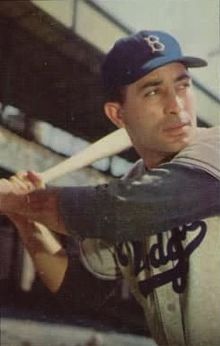Carl Furillo
| Carl Furillo | |||
|---|---|---|---|

Furillo, circa 1953.
|
|||
| Outfielder | |||
|
Born: March 8, 1922 Stony Creek Mills, Pennsylvania |
|||
|
Died: January 21, 1989 (aged 66) Stony Creek Mills, Pennsylvania |
|||
|
|||
| MLB debut | |||
| April 16, 1946, for the Brooklyn Dodgers | |||
| Last MLB appearance | |||
| May 7, 1960, for the Los Angeles Dodgers | |||
| MLB statistics | |||
| Batting average | .299 | ||
| Home runs | 192 | ||
| Runs batted in | 1,058 | ||
| Teams | |||
| Career highlights and awards | |||
|
|||
Carl Anthony Furillo (March 8, 1922 – January 21, 1989), nicknamed "The Reading Rifle" and "Skoonj", was a right fielder in Major League Baseball who played his entire career for the Brooklyn and Los Angeles Dodgers. A member of seven National League champions from 1947 to 1959 inclusive, he batted over .300 five times, winning the 1953 batting title with a .344 average – then the highest by a right-handed hitting Dodger since 1900. Noted for his strong and accurate throwing arm, he recorded 10 or more assists in nine consecutive seasons, leading the league twice, and retired with the fifth-most games in right field (1408) in NL history.
Furillo was born in Stony Creek Mills, Pennsylvania. He left school in the eighth grade, and often felt awkward among his teammates as a result; they would later recall that he rarely socialized with players who were better-educated. He signed with the Reading, Pennsylvania, team in the Interstate League, earning one of his nicknames with his powerful arm; the Dodgers were sufficiently impressed by his ability that they purchased the entire minor league franchise to acquire him. His other nickname, "Skoonj", came from the Italian word scungilli ("snail"), which was his favorite dish.
Arriving in the major leagues in 1946, he batted .295 for the 1947 NL pennant winners, finishing the year ninth in the league with 88 runs batted in. He was one of the key members on the Dodgers' 1949 champions, hitting .322 (4th in the NL) with 18 home runs, and placing among the league's top ten players in RBI (106), slugging average (.506), hits (177), runs (95), triples (10) and total bases (278); he finished sixth in the voting for the MVP Award. In 1950 he batted .305 (7th in the league) with 18 home runs, 106 RBI, and a career-high 99 runs. He achieved a personal best with 197 hits, finishing third in the NL for the second year in a row, for the 1951 team which lost a legendary pennant playoff to the New York Giants; he also batted .295 (9th in the NL) with 91 RBI and 93 runs. In that year he set a team record with 667 at bats, exceeding Ivy Olson's 1921 total of 652; Maury Wills broke his mark with 695 in 1962.
...
Wikipedia
